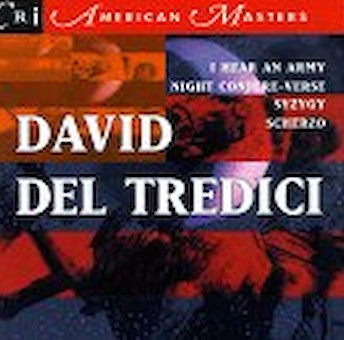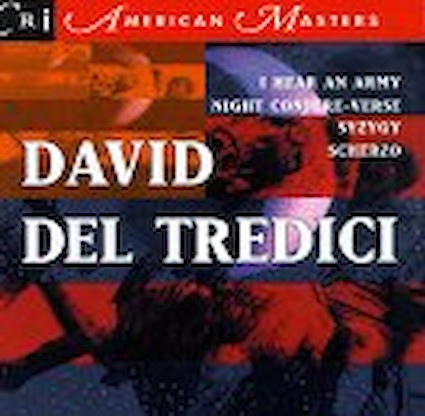Night Conjure-Verse is a song cycle to two poems by James Joyce. Its world premiere took place in San Francisco in 1966. The first idea and much of the ensuing technical apparatus for the piece came from the poetic image of the second poem, which is a mirror commenting on what has been reflected in it. That idea was to oppose two like voices — a soprano — the 'real' voice (the actual events before the mirror), and a counter-tenor — the 'false' voice (the reflection in the mirror). Both have the same range of notes although a very different tone quality. This had to be modified (because a countertenor is often hard to find) to soprano versus mezzo-soprano.
When I began to compose, the idea of mirror reflection expanded into technical means; that is, both poetic image and technic became, in my mind, the same — a symbiosis I find necessary before I can set any poem. To be specific: musical passages are followed by their mirror versions, in both small details and over long sections; two opposing sonority groups — string quartet verses wind septet employed behind the two opposing voices; extremely high tessitura in general is used in all parts to suggest flashes of light from a mirror. There is frequent splintering of syllables of the text and retrograding of the text.
The setting of the first poem, Simples, I composed last and thought of it as another 'light' poem, although a much softer, more mysterious 'moonlight' in contrast to the glaring mirror reflections of 'A Memory..." It, too, abounds in much retrograded motion (rhythmic and melodic) as well as canonic chasing of similar lines — though here with a more playful, delicate, 'moonlighting' quality.
I composed Night Conjure-Verse like one puts together a mosaic or jigsaw puzzle. At first I gathered together seven or eight notebooks full of little ideas or different version of the same idea, with no idea where they would eventually fit. As the pressure of so much material on my hands 'without a home' increased, so would my instincts suddenly snap different bits together and this, in turn, would suggest other large fittings — and so it went in different spots all over the piece at once. Perhaps the only guiding hand through it all was the text (like the picture of the completed jigsaw on every puzzle cover) to which the different tiny elements would adhere in more and more profusion.
One stunning composition does not a successful composer make, but "From a Book of Night Conjure-Verse" confirmed David Del Tredici as a brilliant talent, brimming over with conjured ideas and more important, the intellect to shape them coherently.
Its centerpiece was the "Night Conjure-Verse" by David Del Tredici, the first performance in its revised version. Scored for two singers and accompanying choirs of winds and strings, the settings of two poems by James Joyce suggest images of light and reflection.
"Simples," a spiral of involuted, economically used thematic material, is the gentler of the two and the more accessible.
"A Memory of the Players in a Mirror at Midnight," a sour and biting commentary by a mirror on what has been reflected in it, is built, not surprisingly, on musical refection and inversion. Sung marvelously by Phyllis Bryn-Julson and Rose Taylor, with fine support by TCP instrumental regulars, the work bitingly projected the emotions of the conflict and the brutality of stale love.
It must be noted, too, that the composition by David Del Tredici impresses as one that displays compositional mastery, and a feeling for combining textures that is most impressive. CRI can be commended, too, for the unusually clear and immediate sound of its recording.
David Del Tredici's Night Conjure-Verse puts two James Joyce poems into an almost mesmeric atmosphere, where everything seems to be an echo or fragmented reflection of everything else. The texture is complex and full of color, with two sopranos soaring and chortling through an instrumental environment as dense as a rain-forest.
Audio (2)
Recordings (1)


Joyce Settings, Scherzo
1995, CRI/New World Records (CD 689)Works
Performers
- Phyllis Bryn-Julson, Soprano
- Benita Vanente, Soprano
- Composers Quartet
- Robert Helps, Piano
- David Del Tredici, Piano and Conductor